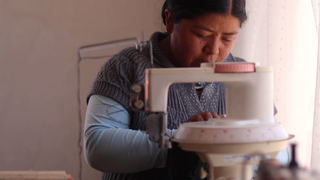By Lorena Burgos.
It is true that the increase in financing for projects led by women and with a focus on women's economic empowerment increases exponentially each year, reaching more women each time. The financing organizations and cooperation agencies have included in their agenda projects that are focused on supporting the economic development of women in the different areas of business and skills where they carry out their main activities. All this has generated positive changes in local economies where previously women did not have visibility, or it was very difficult for them to open a niche in the midst of societies marked by discrimination. Still, the understanding of the importance of investing in projects that strengthen women's economies seems to be unclear. Some call this as “positive discrimination”, under the recognition of the marginality to which women were relegated for a long time, but this brings even more conflict, especially in ultra-conservative groups and deniers of the types of violence and discrimination exercised against women. It is unbelievable to think that with all the rates of abuse and gender-based violence, many still want to deny its existence, but unfortunately it is something that women still have to face, in addition to their daily fight against all the real risks, within and outside of homes.
Let us think then that all this denial and invisibility of the violence exercised against women, therefore, to the need to strengthen their economy to have the possibility of breaking circles of violence and discrimination, which is directly related, has to do with a lack of understanding and education about the enormous benefits that investing in women brings to society as a whole, so let's break a little out of those circles of misinformation as well.
It has been proven that everything that women earn is invested in their families, in the education and health of their children, mainly in societies where paternal abandonment is a problem and families are mostly single-mother. It is enough to look around a little and see that, despite all the efforts to educate parents about family burdens, the burden of parenting continues to fall on mothers, and that is why, whether it is a lot or a little. that they generate, regardless of the economic activity to which they are engaged, they will invest in their families.
It is important to recognize that investing in the family is investing in society, and that women are subsidizing, in many cases, the economic burdens that, in the first instance, correspond to the government, mainly in health and education. All those basic health and education needs that governments is not satisfying, are being covered, whatever it may be, by women who invest all the resources they generate in their families and children. This is also why all social policies on education and health must have a gender perspective, but that is an issue that can be discussed on another occasion.
The truth is that investing in projects that aim to strengthen women's economy is to invest in families, therefore, in the entire community, and not only because said economic strengthening will allow a family to break cycles of poverty and violence, but also because women are organizing themselves into production and development networks that identify them as a whole and allow them to share the same criteria of struggle and resistance against discrimination and inequality, in time to offer them opportunities of a new life and also to their families. This gives a deep sense of hope for the future, because it is a response to the need to find solutions to current problems such as the increase in violence, corruption, climate change, armed conflicts, migratory and refugee crises, lack of employment, scarcity of water and basic services, and so many etcetera that take away people's peace. The answer to all this is women: women and environment, women and production networks, women and peace, women and politics, women in business, women artisan development, women leading real changes.



Fernanda Daudt
This is awesome, can’t agree more.
Carlos
Interesting article on how women economic empowerment catalyses inclusive economic growth, specially in the south!
Rita
Congratulations!!! This article is excellent!!!